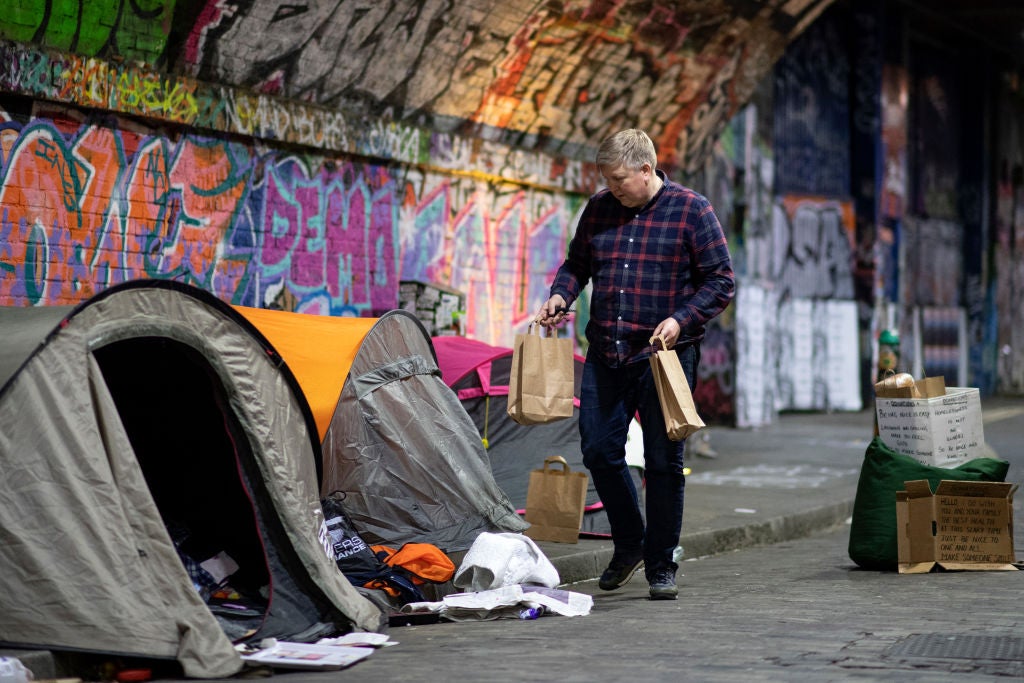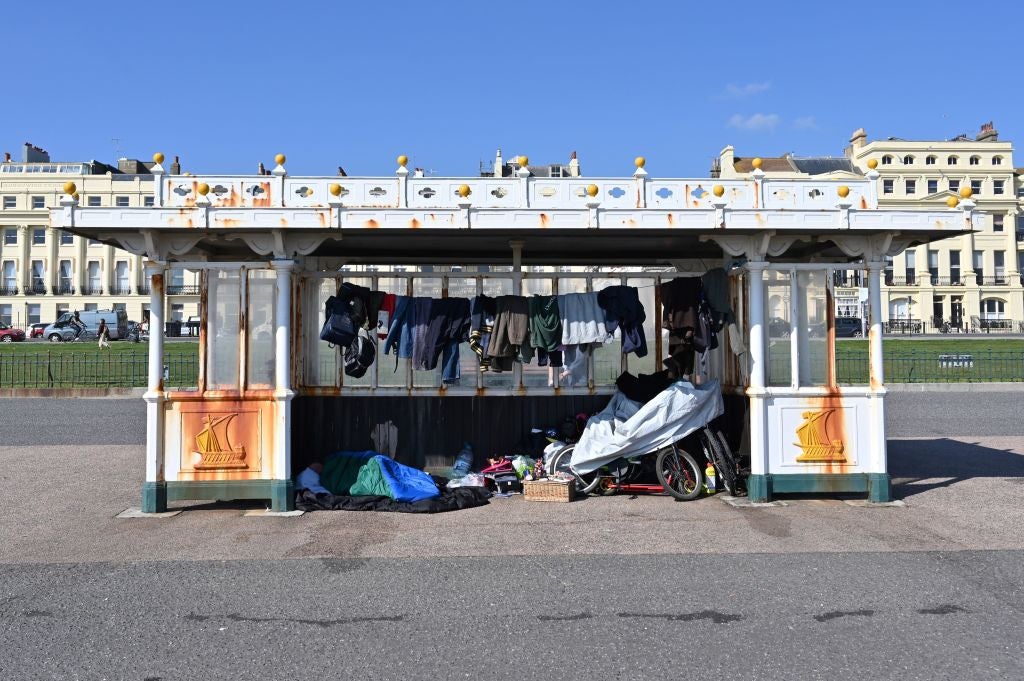9 ways to help the homeless this Christmas
From charity donations to clothes and pet care, how you can make a difference to a rough sleeper this season

Your support helps us to tell the story
From reproductive rights to climate change to Big Tech, The Independent is on the ground when the story is developing. Whether it's investigating the financials of Elon Musk's pro-Trump PAC or producing our latest documentary, 'The A Word', which shines a light on the American women fighting for reproductive rights, we know how important it is to parse out the facts from the messaging.
At such a critical moment in US history, we need reporters on the ground. Your donation allows us to keep sending journalists to speak to both sides of the story.
The Independent is trusted by Americans across the entire political spectrum. And unlike many other quality news outlets, we choose not to lock Americans out of our reporting and analysis with paywalls. We believe quality journalism should be available to everyone, paid for by those who can afford it.
Your support makes all the difference.This year has been especially hard for those who find themselves homeless in the UK. Rough sleepers have to deal with the double threat of the vulnerabilities that come with unsecured housing, plus coronavirus.
The risks of the pandemic are exacerbated when hygiene provisions aren’t readily available and social distancing isn't possible, for example in temporary accommodation. Access to healthcare treatments are more difficult for rough sleepers, and chronic health conditions more common – increasing the risks associated with Covid-19.
The reduced footfall throughout the whole pandemic in public places has had an impact on rough sleepers, who often rely on the public for support. More than 1,000 Big Issue vendors, for example, were out of work during the second lockdown in England last year.
Poverty has risen as a result of the Covid-19 crisis. According to analysis from the Legatum Institute, 320,000 more people were in poverty in the first quarter of this year, compared to before the pandemic. Additionally, the latest government statistics show that more than 180,000 households have been tipped into homelessness since the beginning of the pandemic.
The government has announced an extra £66m to support people who are rough sleeping, which is a start, but we can also help to ease the pressure in our communities.
Read on for nine ways you can make a difference this season:
1. The reverse advent calendar
The concept of the reverse advent calendar is to give something away every day instead of getting a little gift from an advent calendar. Add a daily item to a box in the lead-up to Christmas until it is completely filled with food items, clothing and more, then donate it to a food bank.
The Trussell Trust said it has given out 936,000 emergency food parcels to people across the UK between April and September. Giving to a food bank will help many levels of people dealing with poverty, including homeless people. Check which items are needed at your local food bank before your start.
2. Donate money
There are two conflicting schools of thought on this. Some believe giving money directly to a homeless person is the best course of action, as some of the money you give to charity can end up going into administration costs. Others believe that giving money directly to the recipients perpetuates destructive cycles, and giving money to charity is more effective in the long run in getting people permanently off the streets.
There are many charities doing great work in helping homeless people to rebuild their lives. Money goes on counselling, life skills courses, legal support and more, and charities are always in need of donations – in most cases these can be made online. Try St Mungo's, Centrepoint Homeless Charity, Shelter, The Salvation Army, Crisis, Help the Homeless, and sign up for a subscription of The Big Issue – its new mapping tool allows you to locate a homeless person in your area and help them directly with 50 per cent of the price of a mag going directly them.
Another option is to buy some supermarket store cards. When you're next in-store or doing an online shop – add a few to the bill and then put them in your wallet give them to rough sleepers, so they can buy the supplies they need, when they need to.
3. Be socially kind
Acknowledge rough sleepers by saying hello, asking them how they are, and stopping for a chat – it makes the world of difference. Having conversations helps to combat loneliness. Don't just ignore people.
A past volunteer for Crisis over Christmas told The Independent: "One of the things our guests said they had enjoyed most about staying at the shelter over Christmas was the human contact - actually having conversations with people.
"In a letter to the volunteers, one of the guests said they hadn't spoken to people like that in months. A few kind words and some genuine interest makes a real difference."
4. Advocate for a homeless person
The person best placed to tell you what they need is someone who is sleeping rough, so ask them what they need. This may be the obvious change of clothes, food, or help getting into temporary accommodation, but it might also be helping someone register at a GP surgery or letting someone send a text from your phone.
If you don't have access to a phone, a computer or the internet, and if public services are closed during the pandemic, simple admin can be hugely problematic.

5. Donate supplies
During the colder months, supplies can be a matter of life and death when living on the streets. While doing your Christmas shopping it's easy to order an extra item or two.
Hand warmers, baby wipes, sanitiser, tampons, masks, bin bags, water bottles, socks and toiletries are of use to rough sleepers, as are larger items like a tent or sleeping bag. Ask them what they need and drop it off later. Clothes are of course handy, but make sure they're the right size.
Unhoused is the UK's first shop for the homeless, for every item bought one is donated to a homeless person and they will send you a video or message of the person receiving their donation. The self-cleaning hoodie is a game-changer.
6. Volunteer
Larger charities like Crisis, Shelter and St Mungo's need an influx of nation-wide volunteers for their winter programmes and help doing everything from serving food at soup kitchens to assisting chiropodists and dentists, cleaning accommodations, and providing activities and skill sessions.
Local charities are also in need of hands-on help, London-based Whitechapel Mission and Shelter From The Storm provide nightly accommodation, plus food for those who need it. There are cooking, laundry, cleaning and talking with the guests volunteering opportunities.
7. Do some fundraising
A Remember A Charity poll showed that one in 10 adults has offered their time to a charitable cause during the pandemic. So pick a challenge, the wackier the better, from a carol marathon to building an enormous Santa out of bottle caps, or simply host a Zoom quiz for cash. Get your funding page live and see how big your project grows to raise money for the homeless this season.
8. Feed a homeless person’s pet
Studies have shown that pets can help with mental health issues, and reduce stress, anxiety, and depression. For some rough sleepers, a pet provides purpose, companionship, warmth and protection. A pet's survival can aid a person's survival, but it's also an extra cost to endure. James Bowen's claims his famous cat, Bob, literally saved him from homelessness.
"Bob saved my life," he said. "It’s as simple as that. He gave me so much more than companionship. With him at my side, I found a direction and purpose that I’d been missing," said Bowen, who wrote the heartwarming ode to his pet A Street Cat Named Bob, which was later turned into a movie. Offer a homeless person a tin of pet food or a snack for their pet, or go further with a grooming voucher.
9. Charitable Chrismas gift
When your relatives ask you what you want for Christmas, ask them to donate a gift instead. Most charities have a Christmas gift list, which spans chocolates to pyjamas and thermals. Crisis even puts up Amazon wish lists on its website – so it couldn't be easier. Stand4Socks' bold, ethical designs make great stocking fillers, and the company will donate a pair of socks to a homeless person for every pair bought.
The Big Issue shop is stuffed with goodies from earrings and scarves to bags and candles made by individual crafters, and proceeds go back into the cause. Centre Point offers the chance to buy a homeless person Christmas dinner for £10 or give them a whole Christmas hamper for £50. And Shelter does a classic range of 30 different Christmas cards in packs of 10, with proceeds from sales going to the charity.





Join our commenting forum
Join thought-provoking conversations, follow other Independent readers and see their replies
Comments